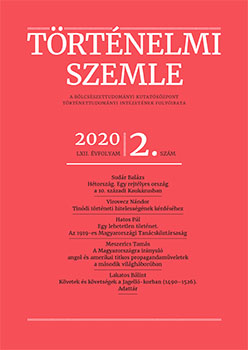Egy lehetetlen történet. Az 1919-es Magyarországi Tanácsköztársaság
An impossible story. The Soviet Republic of Hungary in 1919
Author(s): Pál HatosSubject(s): Pre-WW I & WW I (1900 -1919)
Published by: Magyar Tudományos Akadémia Bölcsészettudományi Kutatóközpont Történettudományi Intézet
Keywords: 1919; communism; bolshevism; memory; Soviet Republic of Hungary
Summary/Abstract: The paper explores the memory-political paradoxes behind the historiography of the Soviet Republic of Hungary and, in the context of the discourses of the period, advances propositions for social and political history research. Who were conquered by communism in the months following the defeat in war and why were they won over? Did Mihály Károlyi voluntarily resign power in favour of Béla Kun or was he tricked into doing so? The events of 21 March 1919 can be interpreted as a coup d’état or rather as a revolution? Did the social democrats, refashioned as socialists, throw away their democratic heritage because they hoped, as Sándor Garbai argued apathetically before the hesitating delegates of the Budepest Workers’ Committee in the late afternoon of 21 March 1919, that the Hungarian justice that had been denied by the western democracy would be forthcoming from the Eastern dictatorship – that is, the Russian Bolsheviks of Lenin? What in fact did the Bolshevisation of Hungarian society consist in, which was observed with a curiosity mixed with compassion in the Council of Four at Paris over the first days? Was it an ideology or a utopia, or a messianistic religious movement, or simply the manifestation of the state of deprivation that characterised a postwar society hit by hunger and misery? Who were the members of the provincial directories, what did the workers want, and what did the agrarian opposition of poor peasants, who crossed the way of their comrades in the capital, really hope for? It is to such questions that the paper aims to frame answers.
Journal: Történelmi Szemle
- Issue Year: 2020
- Issue No: 02
- Page Range: 245-266
- Page Count: 22
- Language: Hungarian

